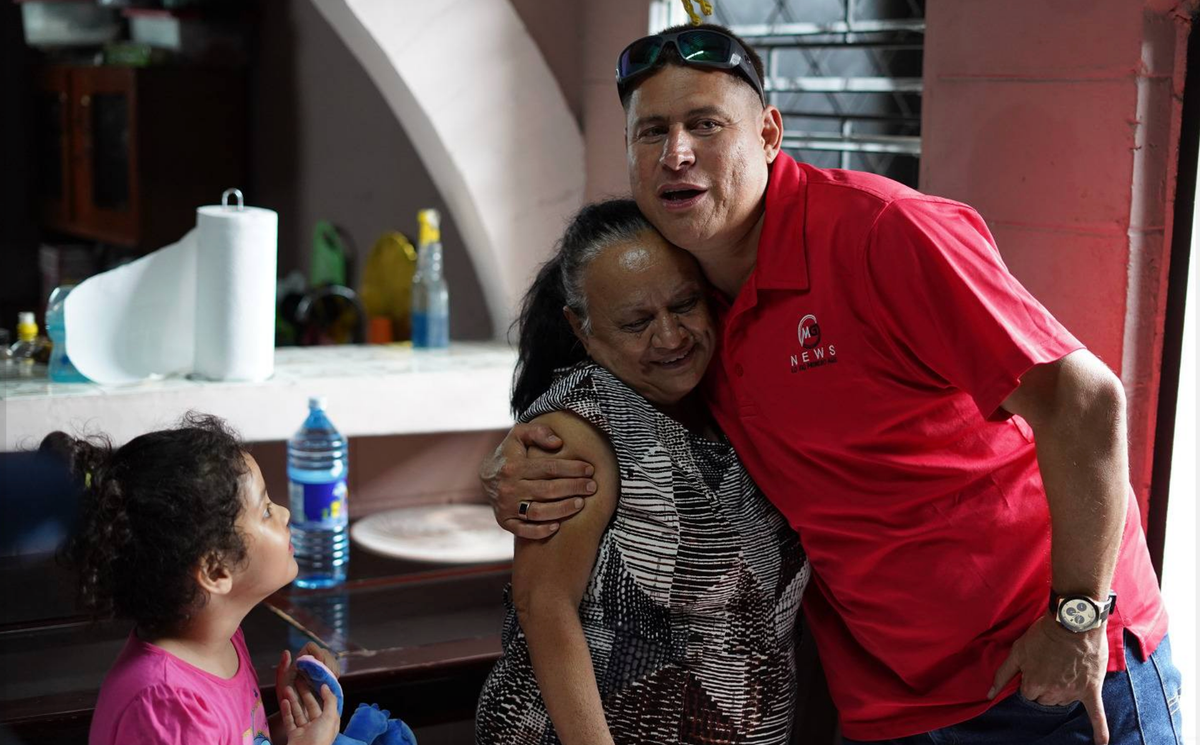The Deportation Of Mario Guevara Is Chilling For Journalism

“Words cannot begin to describe the loss and devastation my family feels. I am in utter shock and disbelief the government has punished my father for simply doing his life’s work of journalism,” declared Oscar Guevara after his father Mario Guevara was deported to El Salvador.
The deportation sets a chilling precedent that any member of the press, who wasn’t born in the United States, could be detained and removed by President Donald Trump’s administration. Officials could potentially purge thousands of reporters from the country, and the U.S. courts wouldn’t stop them.
Mario Guevara is a Spanish-language journalist who lived in the area around Atlanta, Georgia. He fled El Salvador more than 25 years ago. On June 14, he was arrested while covering a “No Kings” protest against President Donald Trump. Police transferred him to a county jail, and days later, he was in the custody of Immigration and Customs Enforcement (ICE).
The government was open about the fact that Mario Guevara was targeted for reporting on ICE operations. He spent more than 100 days in ICE detention while the ACLU of Georgia challenged alleged violations of his rights in a federal court. Yet despite this legal effort, the U.S. Court of Appeals for the Eleventh Circuit refused to stay a deportation order from the Board of Immigration Appeals.
Mario Guevara was transferred to a Louisiana facility, and by 4 a.m. on October 3, U.S. authorities flew him to El Salvador. “His family, including his wife and three children, were not given the opportunity to say goodbye to their father in person,” the ACLU shared.
Upon arrival, El Salvador government officials escorted him off the plane. He was later pictured as he bittersweetly hugged his mom. “My country, my country, my country. Thank God. This isn’t how I wanted to come to my country, but thank God."
A coalition of First Amendment, press freedom, and journalist groups led by the Committee to Protect Journalists (CPJ) and Free Press had issued a call for ICE to free Mario Guevara.
“An Emmy award-winning journalist has been detained for over 100 days—all because the government considers his livestream reporting a threat,” the groups declared. “This is one of the longest periods a journalist has ever been detained in the United States.”
“Guevara is the only known journalist currently behind bars in the U.S. for his reporting. The government’s prolonged detention of Guevara sends a chilling message to all journalists, citizens, and residents who record law enforcement, report on government activities, and seek to report the truth,” the groups added.
The culmination of the Department of Homeland Security’s extraordinary attack on the First Amendment was a stark moment. CPJ said this was the “first time that CPJ [had] documented this type of retaliation” related to journalism.
“Mario Guevara’s deportation will be remembered as a grave betrayal of America’s principles of due process and press freedom. Guevara is the only reporter known to be removed from the country after an arrest stemming from his work,” stated Tim Richardson of PEN America.
Richardson added, “This case delivers a chilling warning to independent journalists in the U.S. and globally: the U.S. will no longer provide safe haven to journalists who as a result of exposing abuses of power are forced to flee their home countries, and may go so far as to punish them further.”
The National Press Club condemned the deportation. “Freedom of the press, protected by the First Amendment, applies to everyone who gathers and publishes news—no matter their citizenship. This case shows how immigration status can be weaponized against reporters, deterring the watchdog journalism the public depends on. That is dangerous for journalists and for the nation’s right to know.”
While in ICE detention, the government kept Mario Guevara in solitary confinement. The entire ordeal took a devastating toll on him psychologically, morally, and economically. “I am the breadwinner for the home. Since my arrest, I have lost tens of thousands of dollars and my company, the news channel MGNews, is on the verge of bankruptcy.”
Now, Mario Guevara is freed from this isolation. The photos that he posted depict a journalist still committed to his craft. He wore his MG News shirt and seems relieved to resume his work and reconnect with family and friends. However, the Salvadoran government has significantly escalated its crackdown on reporters in the past year.
As the ACLU made clear, Guevera had “work authorization, a social security number, and [he had] paid taxes as required by law.” He was eligible for “lawful permanent residency as the beneficiary of an I-130 Petition for Alien Relative, filed by his 21-year-old U.S. citizen son, Oscar,” who "suffers speech issues, recurring seizures, and intense nerve pain after suffering a stroke during surgery to remove a brain tumor.”
Oscar Guevara poignantly described what separation from his father means for him and his family. “He is the center of our family. He is the reason our home feels like home. To me, he’s my rock, and I don’t know what life without him here will look like now that he will be deported.”
“When I was diagnosed with a brain tumor in 2021, it was my dad who centered me, who drove me to my medical appointments, and who lifted me up. Now, I will have to manage my health care on my own, and live thousands of miles away separated from him.”
“My family has been torn apart for no good reason, and I can only hope that we can one day be reunited,” said Oscar Guevara.




Comments ()